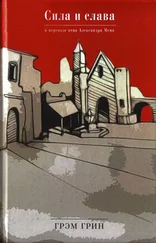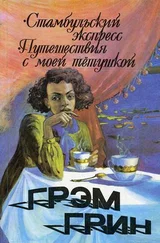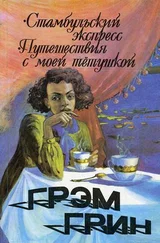Грэм Грин - The Comedians
Здесь есть возможность читать онлайн «Грэм Грин - The Comedians» весь текст электронной книги совершенно бесплатно (целиком полную версию без сокращений). В некоторых случаях можно слушать аудио, скачать через торрент в формате fb2 и присутствует краткое содержание. Год выпуска: 1966, Жанр: Классическая проза, на английском языке. Описание произведения, (предисловие) а так же отзывы посетителей доступны на портале библиотеки ЛибКат.
- Название:The Comedians
- Автор:
- Жанр:
- Год:1966
- ISBN:нет данных
- Рейтинг книги:3 / 5. Голосов: 1
-
Избранное:Добавить в избранное
- Отзывы:
-
Ваша оценка:
- 60
- 1
- 2
- 3
- 4
- 5
The Comedians: краткое содержание, описание и аннотация
Предлагаем к чтению аннотацию, описание, краткое содержание или предисловие (зависит от того, что написал сам автор книги «The Comedians»). Если вы не нашли необходимую информацию о книге — напишите в комментариях, мы постараемся отыскать её.
The Comedians — читать онлайн бесплатно полную книгу (весь текст) целиком
Ниже представлен текст книги, разбитый по страницам. Система сохранения места последней прочитанной страницы, позволяет с удобством читать онлайн бесплатно книгу «The Comedians», без необходимости каждый раз заново искать на чём Вы остановились. Поставьте закладку, и сможете в любой момент перейти на страницу, на которой закончили чтение.
Интервал:
Закладка:
'What's wrong?' I asked.
'Wrong? Nothing is wrong.' He spoke French as well as I did.
'Your men won't let me go on.'
'It's for your own safety. There's a lot of firing on the other side of the international road. Wild firing. I've seen you before, haven't I?'
'I came across the road a month ago.'
'Yes. I remember now. I daresay we shall be seeing some more people like you presently.'
'Do you often get refugees here?'
'We had about twenty guerrillas over just after you came. They are in a camp now in Santo Domingo. I thought there were none left.'
He must have meant the band which Philipot had wanted to contact. I remembered Jones and Philipot talking in the night, while the men listened, of the great plans for an established strongpoint, for a provisional government, for visiting journalists.
'I want to get up to Monte Cristi before dark.'
'You would do better to go back to Elias Pinas.'
'No, I'll wait around if you don't mind.'
'You are welcome.'
I had a bottle of whisky in my car and I made myself more welcome. The man selling jewellery tried to interest me in some ear-rings which he said were sapphire and diamond. Presently he drove away in the direction of Elias Pinas. He had sold the lieutenant a watch and the sergeant two necklaces.
'For the same woman?' I asked the sergeant.
'For my wife,' he said and closed one eye.
It was high noon. I sat on the steps of the guardroom in the shade and considered what I should do if the fruit company turned me down. There was always Mr Fernandez' offer: I wondered whether I would have to wear a black suit.
Perhaps there is an advantage in being born in a city like Monte Carlo, without roots, for one accepts more easily what comes. The rootless have experienced, like all the others, the temptation of sharing the security of a religious creed or a political faith, and for some reason we have turned the temptation down. We are the faithless; we admire the dedicated, the Doctor Magiots and the Mr Smiths for their courage and their integrity, for their fidelity to a cause, but through timidity, or through lack of sufficient zest, we find ourselves the only ones truly committed — committed to the whole world of evil and of good, to the wise and to the foolish, to the indifferent and to the mistaken. We have chosen nothing except to go on living, 'rolled round on Earth's diurnal pourse, With rocks and stones and trees.'
The argument interested me; I daresay it eased the never quiet conscience which had been injected into me without my consent, when I was too young to know, by the fathers of the Visitation. Then the sun came round on to the steps and drove me into the guardhouse with its bunks like stretchers, its pinups and relics of many homes, its heavy airless smell. There the lieutenant came to find me. He said, 'You'll be able to go on soon now. They are coming in.'
Some Dominican soldiers were plodding up the road to the post, walking in single file so as to keep in the shade of the trees. They bore their rifles slung and carried in their hands the weapons of the men who had emerged from the Haitian hills and who walked a few paces behind them, limp with fatigue, wearing an abashed look on their faces like the expression of children who have broken something of value. I didn't recognize any of the negroes, but nearly at the tail of the little column I saw Philipot. He was naked to the waist and he had used his shirt to tie his right arm to his side. When he saw me he said defiantly, 'We had no ammunition left,' but I don't think he recognized me then — he saw only what he thought was an accusing white face. At the very end of the small column two men carried a stretcher. On it lay Joseph. His eyes were open, but he couldn't see the foreign country into which they were carrying him.
One of the men asked, 'Do you know him?'
'Yes,' I said. 'He used to make good rum punches.'
The two men looked at me with disapproval; I realized it was not the kind of speech one should make over the dead. Mr. Fernandez would have done better, and I followed after the stretcher in silence like a mourner.
Somebody had given Philipot a chair inside the guardhouse and a cigarette. The lieutenant was explaining to him that they had no transport until next day and that they had no doctor in the post.
'It's only a broken arm,' Philipot said. 'I fell coming down the ravine. It's nothing at all. I can wait.'
The lieutenant said with kindness. 'We have made a comfortable camp for your people near Santo Domingo. In an old lunatic asylum …'
Philipot began to laugh, 'A lunatic asylum! You are right,' and then to cry. He put his hands over his eyes to hide them.
I said, 'I have a car here. If the lieutenant permits, you needn't wait.'
'Emil is wounded in the foot.'
'We can take him with us.'
'I don't want to be separated from them now. Who are you? Oh, of course, I know you. My mind's confused.'
'The two of you need a doctor. There's no point in waiting here till tomorrow. Are you expecting anyone else to come across?' I was thinking of Jones.
'No, there's no one else.'
I tried to remember how many had come up the road. 'All the rest are dead?' I asked.
'All dead.'
I made the two men as comfortable as I could in the jeep, and the fugitives stood and watched with pieces of bread in their hands. There were six of them, and Joseph lying dead on a stretcher in the shade. They had the dazed look of men who have narrowly escaped from a forest fire. We drove away, two men waved, the others munched their bread.
I said to Philipot, 'And Jones — is he dead?'
'By this time.'
'Was he wounded?'
'No, but his feet gave out.'
I had to drag the information out of him. I thought at first that he wanted to forget, but he was just preoccupied. I said, 'Was he all that you hoped for?'
'He was a wonderful man. With him we began to learn, but he didn't have enough time. The men loved him. He made them laugh.'
'But he spoke no Creole.'
'He did not need words. How many men are there in this lunatic asylum?'
'About twenty. All those you were looking for.'
'When we can get arms again, we will go back.'
I said to comfort him. 'Of course.'
'I would like to find his body. I would like him to have a proper grave. I'm going to put up a stone where we crossed the frontier, and one day when Papa Doc is dead, we shall put a similar stone at the spot where he died. It will be a place of pilgrimage. I shall get the British Ambassador, perhaps a member of the Royal Family …'
'I hope Papa Doc doesn't outlive us all.' We turned out of Elias Pinas on to the good road for San Juan. I said, 'So after all he proved that he could do it.'
'Do what?'
'Lead a commando.'
'He had proved that against the Japanese.'
'Yes. I had forgotten.'
'He was a cunning man. You know how he deceived Papa Doc?'
'Yes.'
'Do you know that he could smell water a long way off?'
'He really could?'
'Of course, but as it happened, water was not a thing we ever lacked.'
'Was he a good shot?'
'Our weapons were so old, so out of date. I had to teach him. He was not a good shot, he went through Burma with a walking stick, he told me, but he knew how to lead.'
'On his flat feet. How did the end come?'
'We came up to the border to find the others, and we were ambushed. It was not his fault. Two men were killed. Joseph was badly hurt. There was nothing to do but escape. We could not go fast because of Joseph. He died coming down the last ravine.'
'And Jones?'
'He could hardly move because of his feet. He found what he called a good place. He said he'd keep the soldiers off till we had time to reach the road — not one of them was anxious to risk himself very close. He said he would follow slowly, but I knew he would never come.'
Читать дальшеИнтервал:
Закладка:
Похожие книги на «The Comedians»
Представляем Вашему вниманию похожие книги на «The Comedians» списком для выбора. Мы отобрали схожую по названию и смыслу литературу в надежде предоставить читателям больше вариантов отыскать новые, интересные, ещё непрочитанные произведения.
Обсуждение, отзывы о книге «The Comedians» и просто собственные мнения читателей. Оставьте ваши комментарии, напишите, что Вы думаете о произведении, его смысле или главных героях. Укажите что конкретно понравилось, а что нет, и почему Вы так считаете.



